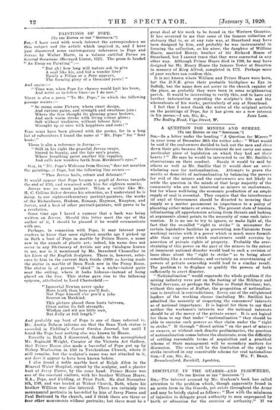A QUESTION FOR MINERS AND OTHERS. [To TEE EDITOR OF
THE " SPECTATOR."] SIR,—In a letter under the heading " A Question for Miners " in your issue of December 20th the writer asks: " What would be said if the coal-owners decided to lock out the men and close down their pits because the Government do not carry out some particular piece of legislation on which they had set their hearts ?" He says he would be interested to see Mi. Smillie's observations on their conduct. Surely it would be said by others as well as Mr. Smillie that it would show an over- whelming case for nationalization. Attempts to prove the merits or demerits of nationalization by balancing the powers for evil of the miners and the coal-owners are not likely to settle the question in the minds of that large majority of the community who are not interested as miners or coal-owners, but for whose well-being the economic production of an ample supply of coal is essential. They require that the interference (if any) of Government should be directed to -securing that supply as a matter paramount in importance to a policy of placating either miners or owners. The present state of tension (eliminating all apprehension arising from threats and looking at arguments alone) points to the necessity of some such inter- vention. It is no use to try to ignore, or make light of, the fact that the so-called " right to strike" (a misnomer for certain legislative facilities in preventing non-Unionists from working) carries with it a power which is much more formid- able than any power which coal-owners could exercise by assertion of private rights of property. Probably the over- straining of this power on the part of the miners to the extent of imminent national disaster would lead to such a revision of loose ideas about the " right to strike " as to bring about something like a revolution; and certainly an overstraining of powers of private ownership would lead to a similar result. The problem is to displace or qualify the powers of both sufficiently to avert disaster.
"Nationalization" would supersede the whole problem if the mining industry were put on the footing of the Military and Naval Services, or perhaps the Police or Postal Services; but, without this species of Kultur, the proposition of nationaliza- tion is involved in contradictions. Every one of the enlightened leaders of the working classes (including Mr. Smillie) has admitted the necessity of respecting the consumers' interests as of national importance. It is logical for them to say that neither the workmen's interests nor the national interests should be at the mercy of the private owner. It is not logical for them to say that under "nationalization " they should be able to exercise such powers as they claim under the " right to strike." If through "direct action" on the part of miners or owners, or without such drastic preliminaries, the question of nationalization comes before the electorate, even the difficulty of settling reasonable terms of acquisition and a practical scheme of State management will be secondary matters for discussion. The crux will be the limitation of the right to strike involved in any conceivable scheme for real nationalize-










































 Previous page
Previous page